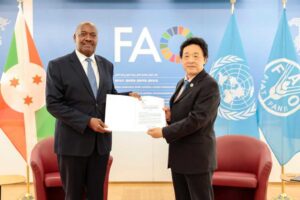The Food and Agriculture Organization of the United Nations (FAO in acronym) was created in 1945 in Quebec. Its headquarters is in Rome, Italy. The Republic of Burundi has been a member of the FAO since 1963, and the Representation Office opened its doors in the country on November 19, 1982. The FAO is based in Bujumbura and has a sub-office in Gitega. FAO Burundi is working hard in order to ensure the food security and to reduce hunger and malnutrition among the most vulnerable populations, through the Representation’s program. FAO Burundi also provides the specialized technical support to the Burundian Government and partners dedicated to promoting food security through the better agricultural practices.
On Monday March 11, 2024, the Ambassador of Burundi to Rome His Excellency Mr. Ernest Ndabashinze presented his letters of credence to the Director General of the Food and Agriculture Organization of the United Nations (FAO) Mr. Qu Dongyu.
FAO’s activities in Burundi revolve around four main axes arising from the mandate of the organization which is essentially for providing the technical assistance to the member countries in the sector of agriculture, livestock, forestry , fishing, the environment, particularly through the development of the policies and strategies necessary for the community recovery; by the implementation of the projects, either with the unding from the FAO Technical Cooperation Program (TCP), or with the funding from bilateral or multilateral development partners; through the collection, analysis and dissemination of information on the rural sector and through the emergency agricultural assistance to the vulnerable populations, in the countries affected by the war or faced with the climatic hazards such as Burundi.

All FAO actions and interventions are carried out within the integrated global, regional and national frameworks, notably the Action Plan, the regional framework for prevention and the management of disaster risks, the sustainable improvement of food and nutritional security by increasing an agricultural, animal, forestry and fisheries production, the sustainable management of the natural resources and by strengthening the resilience to climate change, the National Agricultural Investment Program (PNIA), the Strategic Framework for the fight against poverty, etc.
The Ambassador of Burundi to Rome presents his letters of credence to the Director General of the Food and Agriculture Organization of the United Nations (FAO)
Stay Connected
Must Read
Related News